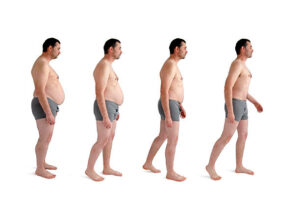Losing weight is not a one size fits all proposition. There are different stages of weight loss that each individual goes through, and it’s important to understand what those stages are in order to be successful. In this blog post, we will define the different stages of weight loss and give you tips on how to best navigate them!
Contents
What Are Weight Loss Stages?
 Understanding the various stages of weight loss can be a great source of encouragement and motivation as you strive to reach your goals. Losing weight is a challenging endeavor that requires dedication, self-discipline, and lifestyle changes. However, with an understanding of the following stages, you will have the necessary tools for success!
Understanding the various stages of weight loss can be a great source of encouragement and motivation as you strive to reach your goals. Losing weight is a challenging endeavor that requires dedication, self-discipline, and lifestyle changes. However, with an understanding of the following stages, you will have the necessary tools for success!
Weight loss stages can range depending on the individual. Yet there is usually a pattern that consists of motivation, weight loss, plateauing and potential relapse. It’s essential to be aware of these likely stops along your journey since it might help you plan ahead and know what to anticipate. Note that progress in this process isn’t always linear—you may very well loop back on yourself.
Therefore, let’s take a look at the main stages of weight loss and how to navigate them.
What Are the Different Weight Loss Stages?
When it comes to losing weight, there are several stages necessary for success. Each individual has different needs and goals when it comes to their own weight-loss journey. So it’s important to understand each stage in order to properly evaluate your progress. The following stages can be used as a guide for reaching your desired goal:
Stage One – Preparation
This is the stage where you set up a plan for your weight loss journey. It’s important to establish realistic goals, create an exercise routine and nutrition plan, and identify potential obstacles. That could potentially derail your progress. For example, if you have a busy lifestyle, you might need to incorporate short workouts into your weekly routine. Or invest in meal prepping to help with time management.
Stage Two – Implementation
This stage involves actually following through with the plans you have set in the preparation stage. Your weight loss journey is a process, so it’s important to stay consistent with your routine. Be sure to track your progress and take note of any areas that may need some tweaking. This can help make sure that you stay on track and reach your goals.
Stage Three – Maintenance
Once you have achieved your desired weight loss, the maintenance stage is all about sustaining it. This involves staying mindful of your nutrition and physical activity habits, as well as managing any potential triggers. That could lead to overeating or lack of exercise. This stage is all about becoming more mindful of your habits. So that you can remain in control and maintain your progress.
Stage Four – Relapse Prevention
Even after reaching your goals, it’s important to stay vigilant for any signs of relapse. It’s all too easy to slip back into old habits and undo all of your hard work. So it’s essential to check in with yourself regularly and be mindful of any potential triggers. Having a strong support system can also go a long way in helping you avoid temptation or slip-ups.
By understanding the various stages of weight loss, you can create an effective plan for your journey. Stay consistent, track your progress, and don’t be afraid to adjust your strategy as needed. With the right steps and some hard work, you can reach your goals in no time.
How Weight Loss Stages Can Impact You?
 The different stages of weight loss can have a profound effect on your body, mind, and emotions. Each stage presents unique challenges and opportunities for growth and renewal. Here’s a look at the stages of weight loss and how they may impact you:
The different stages of weight loss can have a profound effect on your body, mind, and emotions. Each stage presents unique challenges and opportunities for growth and renewal. Here’s a look at the stages of weight loss and how they may impact you:
- Calorie Reduction. The first step in any successful weight loss program is to reduce your caloric intake. This means cutting back on high-calorie foods, such as sweets, chips, fast food, and other unhealthy snacks. At this stage, you may feel deprived of your favorite treats, but sticking to your new diet can set the tone for long-term success.
- Exercise and Activity. Once you’ve reduced your caloric intake, it’s time to start adding exercise to your routine. Starting a regular exercise program can help you burn more calories and build muscle, which further contributes to weight loss. At this stage, you may experience soreness from exercising or feel intimidated by trying new activities.
- Weight Loss Plateau. Even with regular exercise and a balanced diet, it can be difficult to break through a weight loss plateau. If your scale isn’t budging, it might be time to adjust your diet or add more challenging exercises. This can help you break through the plateau and continue to lose weight.
- Behavioral Changes. As you get closer to your goal weight, you may need to make changes in your behavior to maintain a healthy weight. This includes making healthier food choices, sticking with an exercise routine, and monitoring your portions.
- Quality of Life Improvements. After reaching your goal weight, you may experience a significant improvement in your quality of life and overall health. You’ll be able to engage in activities that were once difficult or impossible and have more energy throughout the day.
The stages of weight loss can be challenging, but with determination and perseverance, you can reach your goals and enjoy the many benefits of a healthier lifestyle. With each step, you’ll gain more confidence and self-esteem, setting the stage for lifelong success.
What Are The First Signs Of Weight Loss?
 With weight loss stages, the first signs may not necessarily be the most obvious. Instead, they typically present themselves in unexpected ways. The following are some of the most common early signs of weight loss:
With weight loss stages, the first signs may not necessarily be the most obvious. Instead, they typically present themselves in unexpected ways. The following are some of the most common early signs of weight loss:
- Increased Energy Levels – When you’re beginning to lose weight, your body begins to use its fat stores as energy, which can give you a boost in energy levels. This can be helpful for keeping up with a new exercise routine or just making it through the day without feeling tired.
- Reduced Appetite – As your body adjusts to its new diet, you may find that your appetite decreases naturally. Eating smaller meals more frequently throughout the day can help keep cravings at bay and help you stick to your plan.
- Improved Sleep Quality – Losing weight can improve the quality of your sleep, as excess fat can cause inflammation and make it difficult to get comfortable at night. As the pounds start coming off, so do many of these issues associated with poor sleep quality.
- Changes in Clothes – One of the most noticeable signs of weight loss is when your clothes begin to fit differently. You may find yourself needing to size down or have more room in your favorite shirts and pants. As you continue to lose weight, this can be an exciting milestone in your journey!
- Improved Mood – Along with increased energy levels comes improved moods. Studies have shown that weight loss can reduce feelings of depression, anxiety, and stress. This can make it easier to stay focused on your goals and keep pushing forward in your journey.
- Better Digestion – Excess fat can cause a variety of digestive issues, including constipation and bloat. As you start to lose weight, these symptoms should start to improve as your body is better able to process the food you’re eating.
These are just a few of the early signs of weight loss that you may experience when you first begin your journey. Pay close attention to how your body responds and use it as motivation to continue pushing forward!
Conclusion
In conclusion, weight loss stages may be difficult, but if you take the necessary steps, you can achieve your ideal body weight. Making lifestyle changes like eating nutritious meals and exercising regularly can help you lose weight in a healthy way. Additionally, tracking your progress through tools such as self-monitoring and goal setting will help keep you motivated during the weight loss stages.
While there are many challenges to overcome during weight loss, if you stay focused and diligent, you will succeed in reaching your goals. The key is consistency – do not give up and keep pushing forward even when the results may seem slow.
If you’re interested in learning more, seek the expertise of FitMantra! Our experienced nutritionists can be easily accessed with just a few clicks. And will offer personalized support to assist you in achieving your fitness goals. Our online nutrition counseling, and weight loss program has been designed to help you shed those unwanted pounds! Don’t forget to download our Fitness App available on Android.
